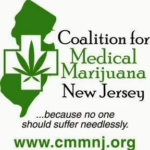Now that the New Jersey Compassionate Use Medical Marijuana Act (CUMMA) has passed into law, patients are asking when and how they can start using medical marijuana. This is a quick review of the law, timeline and other issues. Remember, this is our understanding of the bill. We will all have to wait until the Department of Health and Human Services (DHSS) puts out explicit rules and regulations associated with the CUMMA to have a full understanding of the medical marijuana process. We will post updates as we get more information.
What conditions are eligible for medical marijuana?
1) One of the following conditions, if resistant to conventional medical therapy: seizure disorder, including epilepsy, intractable skeletal muscular spasticity or glaucoma;
2) one of the following, if severe or chronic pain, severe nausea or vomiting, cachexia, or wasting syndrome results from the condition or treatment thereof: positive status for human immunodeficiency virus, acquired immune deficiency syndrome, or cancer;
3) amyotrophic lateral sclerosis, multiple sclerosis, terminal cancer, muscular dystrophy, or inflammatory bowel disease, including Crohn’s disease ;
4) terminal illness, if the physician has determined a prognosis of less than 12 months of life; or
5) any other medical condition or its treatment that is approved by the DHSS by regulation.
Note the last provision. Even if your serious medical condition is not yet covered, it can be added by the DHSS.
When can I get medical marijuana?
This is our current understanding of the timeline for patient ID cards and the formation of Alternative Treatment Centers (ATCs):
CUMMA passed into law 1/18/10. Usually reliable State House sources say regs will be out in 3 mos. (April) and the program running in 6 (July). No real info before that.
So the earliest possible time to be able to go to an ATC is July. However, if the ATCs have to start growing marijuana on that date, it may be another three months or so before the medicine is ready.
Where do I get medical marijuana?
The CUMMA does not allow patients to cultivate marijuana. Instead they will have to register with an Alternative Treatment Center (ATC) and receive it there. Initially there will be 6 non-profit ATCs. Patients will likely have to compensate the ATC for the cost of production of the marijuana.
How do I get a medical marijuana “prescription”?
When the program is running, you must apply for and receive a “registry identity card” from DHSS for your qualifying condition. Your doctor writes a “certification”. You take your registry card and the certification to an ATC to receive the medical marijuana.
Begin a discussion with your doctor NOW
Have as much in place as possible before the law takes effect. Begin a dialogue with your physician now. Discuss why you think you need marijuana for your condition. See what your doctor says. If he agrees, fine. Ask him/her if he would please make note of that in your chart.
If he disagrees, ask him why? Is it his unfamiliarity with marijuana? Or his belief that the risks outweigh the benefits? Ask him if you can present him with some research findings that support your belief (See ASA and NORML links at
http://cmmnj.org/ and the Patients Out of Time link below), then do so. Discuss this with any specialist you might be involved with. Ask him/her if he would please make note of that in your chart. Perhaps get a second opinion.
If he says he has to wait for the law, remember, the law is only partially the issue. The real issue is your need for marijuana as part of your therapy, and a physician agreeing to that. The law is very restrictive and many patients who could benefit will find themselves not qualified under the law. But they may become qualified as doctors and patients request the addition of new conditions to the DHSS regulations.
Info for Docs and nurses: The law offers significant protection to doctors who make medical marijuana “certifications” (recommendations) . There are numerous scientific papers available showing the utility of medical marijuana that many doctors may want to review. We will be putting up links to these papers. Doctors and nurses can also receive information at the upcoming Patients Out of Time Clinical Conference April 15-17
http://www.medicalcannabis.com/Clinical-Conferences/2010-upcoming-conference and the NJ State Nurses Association INPAC Breakfast on Feb. 4
http://www.njsna.org/

